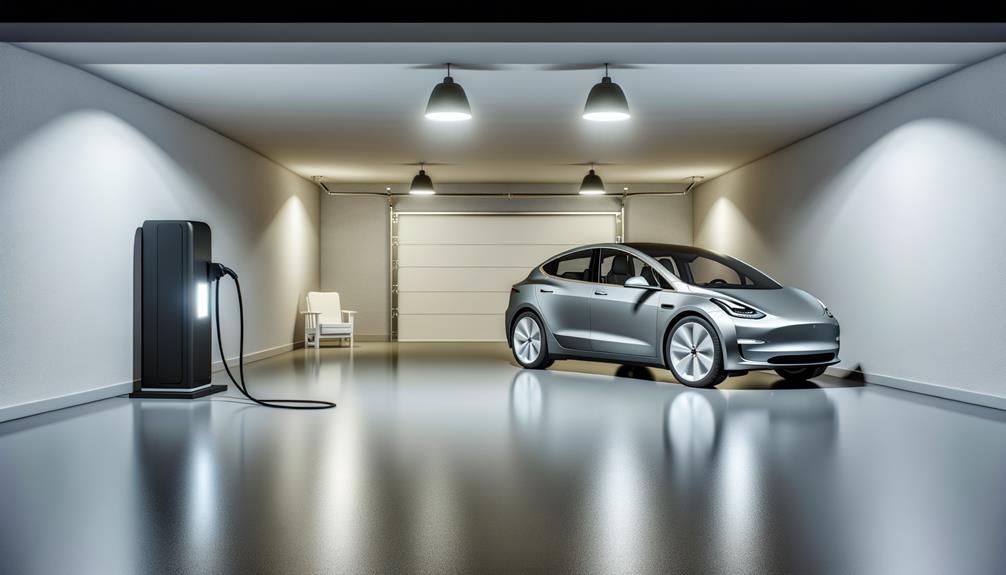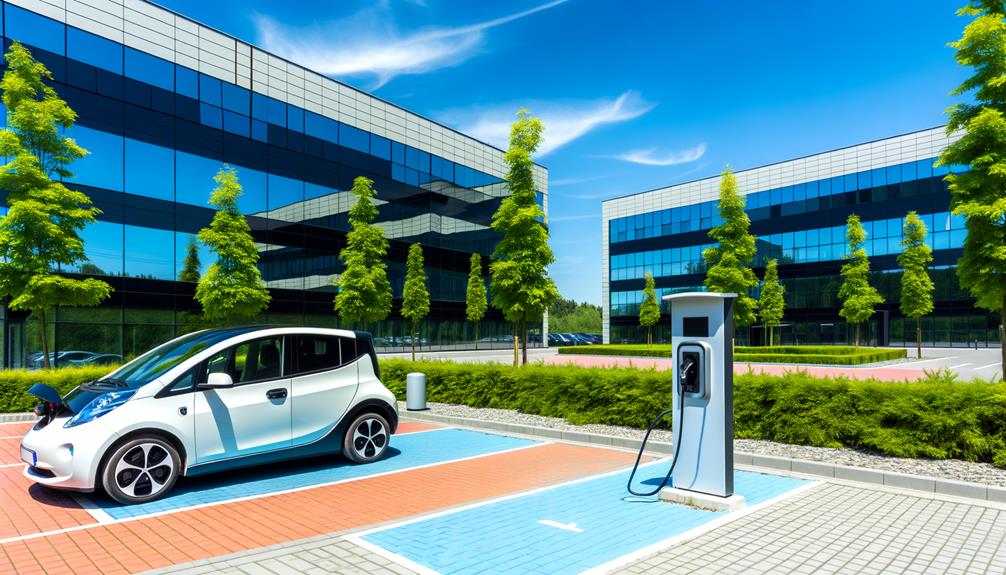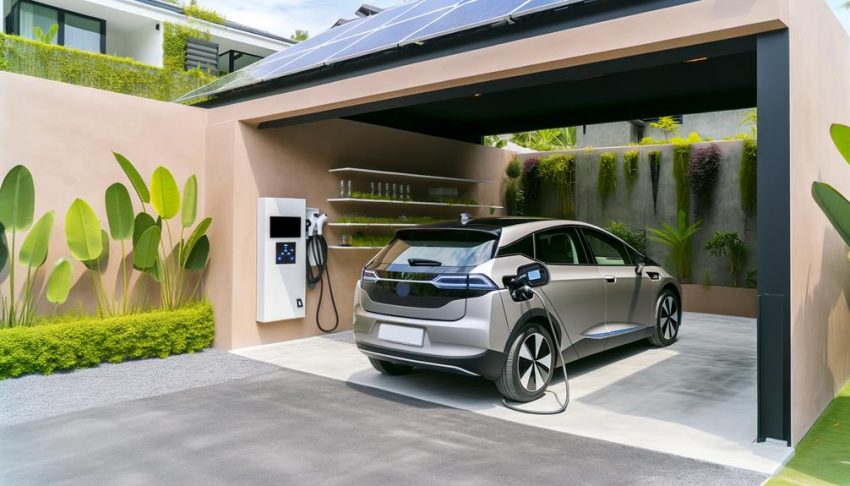When you purchase an electric car, you might wonder if it comes with a charger. Typically, you'll get a Level 1 charger, which you can plug into a standard household outlet for overnight charging. This is quite convenient if your daily mileage is low. Some manufacturers go a step further, including a Type 2 cable for better compatibility with public charging stations. But what happens if you buy a used electric car? It's important to verify if the original cables are included. So, what are your options if the necessary chargers aren't part of the package? Let's explore.
Contents
Charging Basics
When it comes to charging basics for electric vehicles, most EVs come equipped with a Level 1 charger that plugs into a standard 120V outlet, making it convenient for overnight charging. This Level 1 charger provides a charging speed that typically adds about 3-5 miles of range per hour. While this may be sufficient for daily commuting, it's not ideal for longer trips or frequent use.
For faster charging, many EV owners opt for a Level 2 charger, which requires a 240V outlet. This type of Electric Vehicle Supply Equipment (EVSE) greatly increases charging speed, adding up to 60 miles of range in about an hour. Level 2 chargers are commonly used for home charging setups but can also be found at public charging stations. However, not all electric cars come with a Level 2 charger included, so you might need to purchase one separately.
Most new electric cars also include at least one charging cable that is compatible with both home and public charging stations. The specific type and number of cables may vary by make and model, so it's important to check the included equipment when purchasing an EV. This is particularly vital if you're buying a second-hand electric car, as the original charging cables might not always be included.
Understanding these charging basics can help you make informed decisions about your charging needs, whether you plan to rely on home charging or utilize public charging options. Properly equipped, your electric car's charging experience can be both efficient and convenient.
Standard Charging Equipment
Most new electric vehicles (EVs) come equipped with standard charging equipment to facilitate easy and convenient charging. Typically, this includes a Level 1 charging cable that can be plugged into a regular household outlet. This provides a basic charging solution, although it might be slower compared to more advanced options.
The type of charging cable provided can vary by manufacturer. For instance, many EVs come with a Type 2 cable, which is designed for compatibility with public charging stations. This inclusion enhances the versatility of your charging options, allowing you to use both home and public charging solutions. For example, the Electric MINI includes both a three-pin plug for household use and a Type 2 cable as standard charging equipment. Tesla vehicles, on the other hand, come with a dual plug-in charger offering both Level 1 and Level 2 charging options, catering to a wider range of charging needs.
When it comes to used electric vehicles, the situation can be different. These vehicles may not include the original charging cables, so it's essential that buyers confirm with the seller whether these items are included or will need to be purchased separately. This can greatly impact your convenience and the overall cost of the vehicle.
If your EV doesn't come with the necessary charging cables, or if you need additional ones, you can purchase them independently from a variety of retailers. Choices range from basic Level 1 charging cables to more advanced Level 2 options, depending on your specific requirements and the capabilities of your electric vehicle charger.
Home Charging Options

Standard charging equipment provides the basics, but exploring home charging options can greatly enhance your EV experience. Most electric vehicles (EVs) come with a Level 1 charger, which plugs into a standard household outlet. This type of electric vehicle charger is ideal for overnight charging, especially for plug-in hybrids or EV owners who don't drive long distances daily. However, if you need quicker recharges, you might want to contemplate Level 2 charging.
A Level 2 charger considerably reduces the time it takes to recharge your car. While a Level 1 charger might take all night to charge your vehicle, a Level 2 charger can often complete the task in just a few hours. This can be particularly beneficial if you have a busy schedule or frequently use your home EV for daily commuting. However, installing a Level 2 charger usually requires professional installation, as it needs a dedicated 240-volt outlet.
Many EV owners opt for Level 2 chargers for their convenience and efficiency. Tesla vehicles, for example, come with dual plug-in chargers that accommodate both Level 1 and Level 2 charging, offering added flexibility. If you're contemplating upgrading your home charging setup, Home Charging Advisors can assist you in finding suitable charging solutions and potential incentives for installation.
Charging at home offers unparalleled convenience, allowing you to start each day with a fully charged vehicle. Whether you're an existing EV owner or planning to become one, exploring home charging options can make a considerable difference in your electric vehicle experience.
Public Charging Stations
Public charging stations are becoming increasingly prevalent across the U.S., providing crucial support for electric vehicle (EV) owners who may not have access to home charging. These stations can be found in convenient locations like malls, grocery stores, and theaters, making EV charging more accessible than ever.
Approximately 80% of public chargers are Level 2 chargers, which offer a balanced combination of speed and accessibility for EV owners. Level 2 chargers are ideal for situations where you might spend a few hours, such as shopping or watching a movie. Charging costs at public stations are often lower than gasoline prices, with many locations offering free or affordable EV charging options. This can considerably reduce the overall cost of owning an electric vehicle.
The availability and accessibility of charging stations, however, can vary greatly by region. Local governments are actively exploring resources to enhance public charging infrastructure, making it easier for you to find charging options no matter where you are. Most electric vehicles are designed with compatible connectors, including CCS, CHAdeMO, and Tesla Supercharger, ensuring you can use a wide range of public chargers without compatibility issues.
Here's what you need to know about public charging stations:
- Accessibility: Apps and locators help you find charging stations in convenient locations.
- Cost Efficiency: Charging costs are often lower than gasoline; some locations even offer free charging.
- Compatibility: Most EVs support multiple connector types, including CCS, CHAdeMO, and Tesla Supercharger.
Public charging stations are a crucial part of the EV charging ecosystem, ensuring that you have reliable and convenient charging options wherever you go.
Workplace Charging

When it comes to workplace charging, many employers are recognizing the benefits of installing EV charging stations on their premises. By providing charging stations, companies offer their employees the convenience of mid-day top-ups, ensuring their vehicles are always ready for the next journey. This charging infrastructure not only bolsters the flexibility of EV ownership but also complements home charging options.
Workplace charging stations allow employees to run errands during the day without worrying about their vehicle's battery range. This added flexibility can greatly enhance employee satisfaction and retention, as it demonstrates that the employer values their convenience and promotes a forward-thinking, environmentally-friendly workplace.
Advocacy for workplace charging is essential to its broader implementation. Employees and employers alike can push for the installation of charging stations, leading to greater availability and accessibility. Numerous resources and guidance are available to help employers understand the advantages of workplace charging and how it can be seamlessly integrated into their existing infrastructure.
Here is a concise comparison of the benefits of workplace charging:
| Benefit | Description | Impact on Employees |
|---|---|---|
| Convenience | Mid-day top-ups enable more flexibility in daily planning | Increased satisfaction and retention |
| Complement to Home Charging | Provides additional charging options, reducing dependency on home infrastructure | Enhanced EV ownership experience |
| Advocacy Promotion | Encourages broader implementation and accessibility of charging stations | Greater availability at workplaces |
| Employee Retention | Demonstrates employer commitment to sustainability and employee needs | Improved workplace environment |
Upgrading Your Charger
When upgrading your electric vehicle charger, you'll need to contemplate professional installation services, especially if you're opting for a Level 2 charger that requires a 240-volt outlet. Additionally, portable charging solutions can offer flexibility, but make sure they meet safety and power standards. Professional assessment of your home's electrical panel is also essential to avoid unexpected costs.
Professional Installation Services
Upgrading your electric vehicle charger to a Level 2 system is highly recommended to secure peak performance and safety. When you decide to install an EV charging unit at your home, professional installation services are essential. Certified electricians guarantee that the installation complies with local electrical codes and that your electrical panel can handle the new load.
Professional installation typically costs between $1,500 and $3,000, depending on the complexity. If your home's electrical panel requires an upgrade, that can add an extra $2,000 to $4,000. Despite these costs, many utility companies offer incentives or rebates that can help offset the initial expenses.
Here are a few points to reflect on:
- Safety: Certified electricians can assess your home's electrical capacity, ensuring a safe and efficient installation.
- Compliance: Professional services guarantee that the installation meets local electrical codes.
- Incentives: Utility companies often provide rebates that reduce the overall costs.
Opting for professional installation services not only optimizes the charging unit's performance but also enhances the safety and reliability of your EV charging setup. Always consult certified electricians for any installation to secure the best results.
Portable Charging Solutions
While professional installation services guarantee your home setup is safe and up to code, portable charging solutions offer flexibility and convenience for EV owners on the go. Many new electric vehicles (EVs) include a standard Level 1 charging cable, which can be used with a regular household outlet for basic charging needs. However, upgrading to portable Level 2 chargers can be a game-changer, providing considerably faster charging times.
Investing in aftermarket portable chargers allows you to charge from various power sources, making them ideal for those who frequently travel. These chargers often require installation but offer the benefit of faster charging speeds, reducing downtime.
| Charger Type | Charging Speed | Installation Required | Flexibility |
|---|---|---|---|
| Level 1 | Slow | No | Limited |
| Level 2 | Fast | Yes | Moderate |
| Aftermarket | Variable | Possible | High |
| Fast Chargers | Very Fast | Yes | Low |
When upgrading, consider your vehicle's compatibility with different charging levels and connectors. Ensuring your charging port matches the charger's capabilities is essential for peak performance. A high-quality portable charger not only enhances convenience but also greatly reduces charge time, especially valuable if your home has limited charging infrastructure.
Frequently Asked Questions
Do All Electric Cars Come With a Charging Cable?
You'll find that not all electric cars come with a charging cable. Assess charging options, home installation, and public stations. Consider charging speeds, cable compatibility, long distance travel, battery maintenance, electric vehicle incentives, eco-friendly benefits, and future technology.
Do You Get a Free Charger When You Buy an Electric Car?
You usually get a free charger with your electric car, but options vary. Charger types, home charging installation requirements, and charging speed can differ. Check warranty coverage, public charging network access, cost comparisons, and government incentives.
Can You Plug an Electric Car Into a Regular Outlet?
You can plug an electric car into a regular outlet, but the charging speed will be slow. For better energy efficiency and charging safety, consider using a Level 2 charger. Extension cord usage isn't recommended for daily home charging.
What Does It Cost to Put in a Charger for an Electric Car?
For installation costs, expect $1,500 to $3,000 for a Level 2 home setup. Electrical upgrades can add $2,000 to $4,000. Government incentives help. Portable chargers offer flexibility. Installation professionals guarantee ideal charging speed, reduced maintenance requirements, and efficient energy consumption.
Conclusion
In conclusion, when you purchase an electric car, it usually comes with at least a Level 1 charger, which is suitable for standard household outlets. Many manufacturers also provide Type 2 cables for public charging station compatibility. Tesla vehicles often include dual plug-in options for added flexibility. If you're buying a second-hand electric car, verify that the original charging cables are included. For enhanced convenience, consider upgrading your charger for faster and more efficient home charging.
